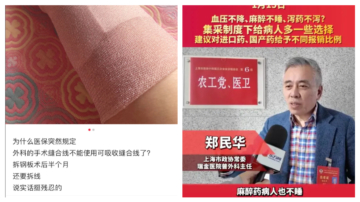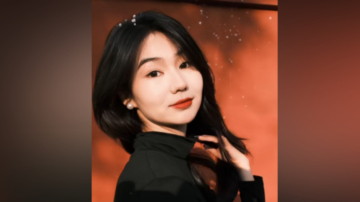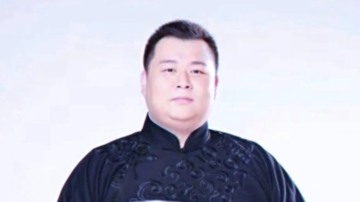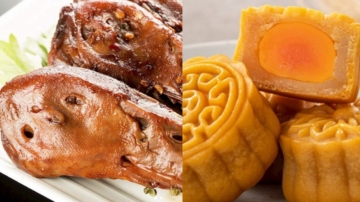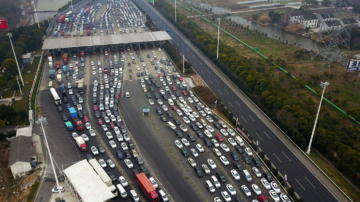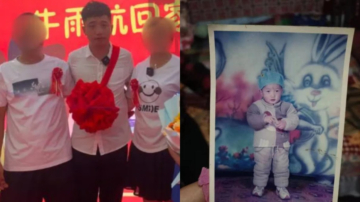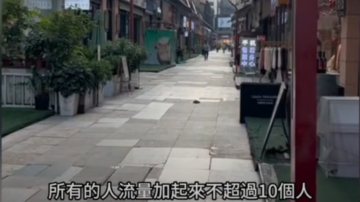【新唐人2012年7月17日訊】剛剛恢復政治權利,但仍被中共當局變相拘禁在家中的大陸維權人士胡佳透露,當局曾經試圖以巨額資金收買他,要求他自認有罪,並放棄國際社會頒給他的人權獎,但被他拒絕。中共的作法連居間傳話的國保大隊長都認為,太骯髒。歐洲議會也指控中共施壓,不讓頒獎給胡佳。
2008年,胡佳被中共當局以「煽動顛覆國家政權罪」判刑3年半,引起國際關注。同年,他獲得了諾貝爾和平獎的提名,歐洲議會並授予他最高人權獎項--薩哈洛夫精神自由獎。
胡佳說,08年10月29號晚,北京國保總隊余姓大隊長到監獄告訴他,有可能提前釋放他,條件是發表一個認罪聲明。
胡佳:「聲明我當時的身份不適合獲得這樣的獎項,不適宜有這種提名,那就等於讓你向世界宣佈,你認罪,你錯了,共產黨給你定罪實際上是依照法律,是有理的。」
「薩哈洛夫人權獎」的獎金有5萬歐元,傳話的大隊長表示,如果胡佳覺得經濟上有損失,當局可以給他雙倍的補償,但胡佳沒有接受。
胡佳:「那個時候我還是蠻清醒的,至少在這裡面沒有動過一絲的念頭,我說你們的錢是納稅人的錢,這種方法等於說是利誘,然後的話來架空維權者,這種方法實在是上不了檯面的,然後國保總隊余總他也說,這個當然是一個最骯髒的方法。」
中共當局雖然知道這是一種最骯髒的交易方式,但從08年10月底一直到12月10號諾貝爾和平獎頒獎,一共派人到監獄找過胡佳7次。對於中共外交部如此迫切的想達成這項交易,胡佳表示,這是一個可怕的陰謀。
胡佳:「如果你真的和他們達成這種交易的話,那麼你等於把你的靈魂出賣了,道德良知啊,這些準則全都出賣了,來換取一點點人身自由,來換取一些經濟利益。實際上的話,你背叛了自己,然後你也背叛了你所追求的價值觀。」
胡佳認為,這同時也意味著,以後會有更多的民眾,會被中共當局所謂的「煽動顛覆國家政權罪」的惡法所傷。
胡佳:「國際社會,會說,如果我們再給他一種道義的支持,再給他比如國際性的一些獎項啊,無論是政府頒發的,還是人權組織頒發的,那麼會不會還會出現這種情況呢?你等於是讓國際社會,那些支持中國人權,民主事業的國際社會的成員是非常寒心的。」
胡佳不為強權、利益折腰的作為,讓獄警感到敬佩,胡佳說,他在坐牢期間,有獄警告訴他,相信有一天他會在人權事業上成為英雄。
胡佳:「你到底有罪沒罪,他不去做這種探討,他覺得那不是他能分辨的,然後,有些獄警就說,以後的結果還真難預料,這個國家確實不缺少冤假錯案,也確實不缺少將來的平反啊,恢復名譽這些東西。」
法國《解放報》14號刊文指責中共當局用金錢讓抗議者閉嘴。文章就日前引發公眾關注的陝西7個月胎兒被引產,當局給孕婦7萬多元補助金一事,指出,當受害人遭遇執法不公時,一旦引發輿論的關注,中共當局就希望用錢讓他們閉嘴。
報導說,特殊情況下,中共還會給出數額超常的款項,廣東烏坎薛錦波事件就是一例。在輿論壓力下,當局給予他們高達380萬元的補償。但這項補償協議書既沒有對薛錦波的死因作任何說明,也沒有做任何道歉。對於中共來說,既收買了對司法的踐踏,也挽回了面子。
胡佳指出,在中國,那些沒有被公眾輿論關注的受害者數不勝數,他們的境遇更悲慘,他希望整體社會能多去關注這些弱勢群體,同時他也希望更多的人能站出來,他說,公民的人權和自由是由自己去行使和創造,不是靠中共恩賜。
採訪編輯/李韻 後製/李若琳
Hu Jia Exposes the Chinese Authorities 『Shady Bribery』.
Mainland human rights activist Hu Jia, whose political rights
have been restored recently, disclosed Chinese authorities
had tried to bribe him with large sums of money.
He was asked to admit being guilty and to give up his Human
Rights Award received from the international community.
Hu Jia refused. Even the captain of National Security Corps
thought the CCP's practice was below par..
The European Parliament also accused the Chinese authorities
of placing pressure upon them.
In 2008, after being sentenced to 3 1/2 years in jail
upon charges of "inciting subversion of state power”,
Hu Jia had drawn international attention.
In the same year, he won the Nobel Peace Prize nomination;
The European Parliament awarded him the spirit of the
Sakharov Prize for Freedom. The highest of human rights awards.
Hu Jia said on the night of October 29, 2008, Captain Yu
from the National Security Corps came to see him in prison.
Telling him he could be released early
if he declared “being guilty.”
Hu Jia: “To declare myself not suitable for this award,
not suitable for such nominations.
It would mean to confess to the world I am wrong;
the CCP’s conviction of me is then so called justified, according to the law.”
The captain said the prize money from the Sakharov award
is € 50,000. Hu Jia could be compensated twice as much, yet he still refused.
Hu Jia: "At that time I was quite sober,
at least I was not moved.
I said your money is taxpayers' money,
and you are using it to tempt me first, humiliate me later.
This is very a filthy act. The captain agreed,
it was one of the filthiest ways.”
The Chinese authorities knew this was a dirty business
of theirs.
During the Nobel Peace Prize awarding ceremony,
between August and December 2008,
the authorities had sent people on seven separate occasions
to see Hu Jia.
The Ministry of Foreign Affairs was so eager to make a deal.
Hu said this was a terrible conspiracy.
Hu Jia: "If you really reach such a deal with them, you are
selling your soul, conscience, and moral guidelines
in exchange for a little personal freedom and economic gain.
So, you betrayed yourself and the values you most cherish.”
Hu also believes this to mean, future generations will also be
hurt upon such charges as “ inciting subversion of state power."
Hu Jia: "The international community will say, if we give him
moral support, give him an international award,
whether it is issued by the government or not,
will this scenario occur again?
It is a chilling thought for the international community and
those who support human rights and democracy in China today.”
Hu Jia’s refusing money and standing up to power,
won him the admiration from prison guards.
One guard even said, one day he would become a hero in
the cause for human rights.
Hu Jia: "He doesn’t know whether you are truly guilty of not;
he did not have the ability to tell.
Some guards did say it was hard to predict things in China,
that many wrongful cases and re-dressings were already in the past.”
An article on the 14th publication of French "Liberation", accused
the Chinese authorities of paying hush money to protestors.
It cited the case in Shaanxi: a 7-month fetus being induced.
The pregnant woman received 70,000 yuan in compensation.
It pointed out when victims suffered from a denial of justice,
it triggered the attention of the media and public opinion.
The Chinese authorities then used money to keep them quiet.
It reported that under special circumstances, CCP will give
lots of money, like at Guangdong Wukan Xue Jinbo incident.
Under pressure from public opinion, 3.8 million yuan was
awarded as compensation.
But the agreement offers neither a reason for Xue’s death,
nor an apology.
The CCP paid cash for a violation of the judiciary,
all in the name of saving face.
Hu Jia pointed out countless victims in China lacked the help
from public opinion and their situations were even more tragic.
He hopes that the community as a whole can pay more attention
to these vulnerable groups.
Hoping more people will stand up to exercise their basic
human rights and help create more freedom for the community,
yet not waiting for the authorities to bestow such things.
2008年,胡佳被中共當局以「煽動顛覆國家政權罪」判刑3年半,引起國際關注。同年,他獲得了諾貝爾和平獎的提名,歐洲議會並授予他最高人權獎項--薩哈洛夫精神自由獎。
胡佳說,08年10月29號晚,北京國保總隊余姓大隊長到監獄告訴他,有可能提前釋放他,條件是發表一個認罪聲明。
胡佳:「聲明我當時的身份不適合獲得這樣的獎項,不適宜有這種提名,那就等於讓你向世界宣佈,你認罪,你錯了,共產黨給你定罪實際上是依照法律,是有理的。」
「薩哈洛夫人權獎」的獎金有5萬歐元,傳話的大隊長表示,如果胡佳覺得經濟上有損失,當局可以給他雙倍的補償,但胡佳沒有接受。
胡佳:「那個時候我還是蠻清醒的,至少在這裡面沒有動過一絲的念頭,我說你們的錢是納稅人的錢,這種方法等於說是利誘,然後的話來架空維權者,這種方法實在是上不了檯面的,然後國保總隊余總他也說,這個當然是一個最骯髒的方法。」
中共當局雖然知道這是一種最骯髒的交易方式,但從08年10月底一直到12月10號諾貝爾和平獎頒獎,一共派人到監獄找過胡佳7次。對於中共外交部如此迫切的想達成這項交易,胡佳表示,這是一個可怕的陰謀。
胡佳:「如果你真的和他們達成這種交易的話,那麼你等於把你的靈魂出賣了,道德良知啊,這些準則全都出賣了,來換取一點點人身自由,來換取一些經濟利益。實際上的話,你背叛了自己,然後你也背叛了你所追求的價值觀。」
胡佳認為,這同時也意味著,以後會有更多的民眾,會被中共當局所謂的「煽動顛覆國家政權罪」的惡法所傷。
胡佳:「國際社會,會說,如果我們再給他一種道義的支持,再給他比如國際性的一些獎項啊,無論是政府頒發的,還是人權組織頒發的,那麼會不會還會出現這種情況呢?你等於是讓國際社會,那些支持中國人權,民主事業的國際社會的成員是非常寒心的。」
胡佳不為強權、利益折腰的作為,讓獄警感到敬佩,胡佳說,他在坐牢期間,有獄警告訴他,相信有一天他會在人權事業上成為英雄。
胡佳:「你到底有罪沒罪,他不去做這種探討,他覺得那不是他能分辨的,然後,有些獄警就說,以後的結果還真難預料,這個國家確實不缺少冤假錯案,也確實不缺少將來的平反啊,恢復名譽這些東西。」
法國《解放報》14號刊文指責中共當局用金錢讓抗議者閉嘴。文章就日前引發公眾關注的陝西7個月胎兒被引產,當局給孕婦7萬多元補助金一事,指出,當受害人遭遇執法不公時,一旦引發輿論的關注,中共當局就希望用錢讓他們閉嘴。
報導說,特殊情況下,中共還會給出數額超常的款項,廣東烏坎薛錦波事件就是一例。在輿論壓力下,當局給予他們高達380萬元的補償。但這項補償協議書既沒有對薛錦波的死因作任何說明,也沒有做任何道歉。對於中共來說,既收買了對司法的踐踏,也挽回了面子。
胡佳指出,在中國,那些沒有被公眾輿論關注的受害者數不勝數,他們的境遇更悲慘,他希望整體社會能多去關注這些弱勢群體,同時他也希望更多的人能站出來,他說,公民的人權和自由是由自己去行使和創造,不是靠中共恩賜。
採訪編輯/李韻 後製/李若琳
Hu Jia Exposes the Chinese Authorities 『Shady Bribery』.
Mainland human rights activist Hu Jia, whose political rights
have been restored recently, disclosed Chinese authorities
had tried to bribe him with large sums of money.
He was asked to admit being guilty and to give up his Human
Rights Award received from the international community.
Hu Jia refused. Even the captain of National Security Corps
thought the CCP's practice was below par..
The European Parliament also accused the Chinese authorities
of placing pressure upon them.
In 2008, after being sentenced to 3 1/2 years in jail
upon charges of "inciting subversion of state power”,
Hu Jia had drawn international attention.
In the same year, he won the Nobel Peace Prize nomination;
The European Parliament awarded him the spirit of the
Sakharov Prize for Freedom. The highest of human rights awards.
Hu Jia said on the night of October 29, 2008, Captain Yu
from the National Security Corps came to see him in prison.
Telling him he could be released early
if he declared “being guilty.”
Hu Jia: “To declare myself not suitable for this award,
not suitable for such nominations.
It would mean to confess to the world I am wrong;
the CCP’s conviction of me is then so called justified, according to the law.”
The captain said the prize money from the Sakharov award
is € 50,000. Hu Jia could be compensated twice as much, yet he still refused.
Hu Jia: "At that time I was quite sober,
at least I was not moved.
I said your money is taxpayers' money,
and you are using it to tempt me first, humiliate me later.
This is very a filthy act. The captain agreed,
it was one of the filthiest ways.”
The Chinese authorities knew this was a dirty business
of theirs.
During the Nobel Peace Prize awarding ceremony,
between August and December 2008,
the authorities had sent people on seven separate occasions
to see Hu Jia.
The Ministry of Foreign Affairs was so eager to make a deal.
Hu said this was a terrible conspiracy.
Hu Jia: "If you really reach such a deal with them, you are
selling your soul, conscience, and moral guidelines
in exchange for a little personal freedom and economic gain.
So, you betrayed yourself and the values you most cherish.”
Hu also believes this to mean, future generations will also be
hurt upon such charges as “ inciting subversion of state power."
Hu Jia: "The international community will say, if we give him
moral support, give him an international award,
whether it is issued by the government or not,
will this scenario occur again?
It is a chilling thought for the international community and
those who support human rights and democracy in China today.”
Hu Jia’s refusing money and standing up to power,
won him the admiration from prison guards.
One guard even said, one day he would become a hero in
the cause for human rights.
Hu Jia: "He doesn’t know whether you are truly guilty of not;
he did not have the ability to tell.
Some guards did say it was hard to predict things in China,
that many wrongful cases and re-dressings were already in the past.”
An article on the 14th publication of French "Liberation", accused
the Chinese authorities of paying hush money to protestors.
It cited the case in Shaanxi: a 7-month fetus being induced.
The pregnant woman received 70,000 yuan in compensation.
It pointed out when victims suffered from a denial of justice,
it triggered the attention of the media and public opinion.
The Chinese authorities then used money to keep them quiet.
It reported that under special circumstances, CCP will give
lots of money, like at Guangdong Wukan Xue Jinbo incident.
Under pressure from public opinion, 3.8 million yuan was
awarded as compensation.
But the agreement offers neither a reason for Xue’s death,
nor an apology.
The CCP paid cash for a violation of the judiciary,
all in the name of saving face.
Hu Jia pointed out countless victims in China lacked the help
from public opinion and their situations were even more tragic.
He hopes that the community as a whole can pay more attention
to these vulnerable groups.
Hoping more people will stand up to exercise their basic
human rights and help create more freedom for the community,
yet not waiting for the authorities to bestow such things.

